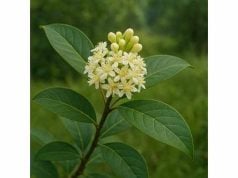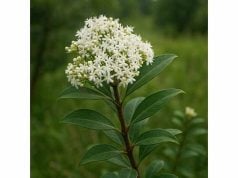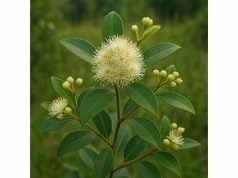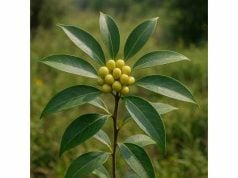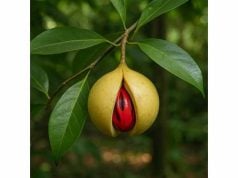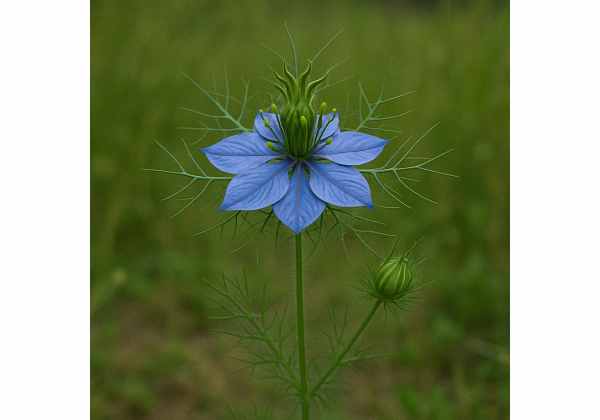
Nigella arvensis is a lesser-known species within the Nigella genus that has attracted growing attention for its potent medicinal properties and diverse health benefits. Traditionally used in various cultural healing practices, this herb is rich in bioactive compounds including essential oils, flavonoids, alkaloids, and saponins. These constituents contribute to its powerful antioxidant, anti-inflammatory, and antimicrobial effects, supporting immune function, cardiovascular health, and overall well-being. Nigella arvensis is utilized in the preparation of herbal teas, tinctures, and topical formulations, making it a versatile addition to natural medicine and integrative health practices.
Table of Contents
- Plant Profile and Identification
- Phytochemistry and Active Compounds
- Health Benefits and Core Properties
- Applications and Safety Guidelines
- Research Insights and Significant Studies
- Frequently Asked Questions
Plant Profile and Identification
Nigella arvensis is a herbaceous annual plant belonging to the Ranunculaceae family, the same botanical family as its more famous relative, Nigella sativa. It is native to parts of Asia and the Mediterranean region, where it has adapted to thrive in arid, well-drained soils and warm climates. The plant is characterized by its finely divided, feathery leaves, which create a soft, airy appearance. During its brief flowering period, it produces small, delicate flowers that typically range from pale blue to white, arranged in loose clusters at the plant’s apex.
Morphologically, Nigella arvensis is distinguished by its slender stem, which may grow between 30 and 60 centimeters in height. The plant’s leaves are deeply lobed and have a light green hue that contrasts strikingly with the dark, almost black seeds it eventually produces. These seeds, which are the most valued part of the plant, are aromatic and have a slightly bitter, peppery flavor. Traditionally, they have been used both as a spice in culinary dishes and as a potent herbal remedy.
The natural habitat of Nigella arvensis is typically found in open fields, meadows, and disturbed areas where sunlight is abundant. Its ability to flourish in poor soils and under conditions of limited water availability underscores its resilience and adaptability. Over centuries, local communities have embraced Nigella arvensis not only for its culinary and medicinal uses but also for its aesthetic qualities, as its delicate flowers and feathery foliage lend a subtle beauty to natural landscapes.
Ethnobotanical records indicate that various cultures have long recognized the healing potential of Nigella arvensis. Its seeds and extracts have been traditionally used to treat respiratory ailments, digestive disorders, and inflammatory conditions. Modern herbalists continue to explore its benefits, driven by both historical usage and emerging scientific evidence. As interest in natural remedies grows globally, Nigella arvensis is increasingly being studied for its capacity to complement conventional treatments, particularly in the areas of chronic inflammation and oxidative stress.
In summary, Nigella arvensis is a resilient, aromatic herb with a distinctive appearance and a rich history in traditional medicine. Its ability to thrive in challenging environments, coupled with its diverse therapeutic applications, makes it a valuable plant both for its ecological role and its potential contributions to holistic health.
Phytochemistry and Active Compounds
The health-promoting properties of Nigella arvensis are underpinned by its complex phytochemical composition. Scientific investigations have identified numerous bioactive compounds in the seeds, leaves, and essential oil of this herb. These compounds work synergistically to confer a wide range of therapeutic effects. The key active constituents include:
- Thymoquinone
Thymoquinone is widely recognized as one of the primary active constituents in the Nigella genus. In Nigella arvensis, thymoquinone exhibits potent antioxidant, anti-inflammatory, and anticancer activities. It functions by scavenging free radicals, thereby reducing oxidative stress and cellular damage. Additionally, thymoquinone helps modulate immune responses, contributing to the overall protective effects of the herb. - Flavonoids
Flavonoids such as quercetin, kaempferol, and rutin are present in significant amounts in Nigella arvensis. These polyphenolic compounds are renowned for their antioxidant properties, which help protect cells against damage from environmental stressors. Their anti-inflammatory capabilities also play a role in reducing chronic inflammation, thereby supporting cardiovascular and neurological health. - Alkaloids
The herb contains various alkaloids that contribute to its therapeutic profile. These alkaloids are believed to possess analgesic and neuroprotective properties. By interacting with cellular receptors and modulating neurotransmitter activity, they can help alleviate pain and support cognitive function. - Saponins
Saponins are glycosides that enhance the absorption of nutrients and improve the bioavailability of other compounds. In Nigella arvensis, saponins contribute to its digestive benefits by promoting smooth gastrointestinal motility. They also have cholesterol-lowering effects, which further support cardiovascular health. - Essential Oils
The essential oil fraction of Nigella arvensis is composed of a blend of terpenes, including limonene, pinene, and linalool. These volatile compounds provide the herb with its characteristic aroma and contribute significantly to its antimicrobial, antispasmodic, and decongestant properties. They are especially effective in aromatherapy and topical applications. - Phenolic Acids
Phenolic acids, such as caffeic acid and ferulic acid, are important antioxidants found in Nigella arvensis. These acids work synergistically with flavonoids to enhance the overall antioxidant capacity of the herb, supporting skin health and reducing inflammation. - Tannins
Tannins in Nigella arvensis have strong astringent properties, making them useful in wound healing and for reducing inflammation. They are also effective in managing gastrointestinal issues by tightening mucosal tissues and alleviating irritation.
The synergy among these compounds is crucial to the herb’s effectiveness. Advanced techniques like high-performance liquid chromatography (HPLC) and gas chromatography-mass spectrometry (GC-MS) have been instrumental in isolating and quantifying these constituents, thereby providing a scientific basis for traditional uses. Environmental factors such as soil composition, climate, and harvesting time can influence the concentration of these compounds, which may affect the potency and efficacy of Nigella arvensis preparations.
The rich phytochemical profile of Nigella arvensis not only validates its historical medicinal use but also highlights its potential for development into standardized herbal supplements. As research continues, these bioactive compounds are being explored for their potential applications in pharmaceuticals, particularly in the areas of anti-cancer therapy, immune modulation, and chronic disease management.
Health Benefits and Core Properties
Nigella arvensis offers a diverse array of health benefits, which are largely attributed to its unique chemical composition. Its bioactive constituents work together to provide a holistic approach to health, addressing multiple bodily systems simultaneously. Key health benefits include:
- Antioxidant Protection:
The robust antioxidant properties of thymoquinone, flavonoids, and phenolic acids in Nigella arvensis help neutralize free radicals and reduce oxidative stress. This defense mechanism is vital in preventing cellular damage and may lower the risk of chronic diseases such as cancer, cardiovascular disorders, and neurodegenerative conditions. - Anti-Inflammatory Effects:
Nigella arvensis is particularly effective in reducing inflammation, thanks to its potent thymoquinone content and complementary anti-inflammatory compounds. These effects can help alleviate symptoms associated with inflammatory conditions like arthritis, asthma, and inflammatory bowel disease, thereby supporting overall systemic health. - Immune System Enhancement:
The herb’s immunomodulatory properties enable it to balance and strengthen the immune system. Regular intake of Nigella arvensis can help enhance the body’s natural defenses, making it more resilient against infections and environmental stressors. This boost in immunity is especially beneficial during seasonal changes or periods of high stress. - Digestive Health Support:
Traditional uses of Nigella arvensis include its role as a digestive aid. Saponins and tannins in the herb stimulate digestive enzymes, promote gastrointestinal motility, and help soothe irritated digestive tracts. These properties make it effective in managing indigestion, bloating, and other digestive disturbances, leading to improved nutrient absorption. - Respiratory Benefits:
The essential oils found in Nigella arvensis exhibit decongestant and antimicrobial properties. Inhalation of these oils, whether through steam therapy or aromatherapy, can help clear nasal passages, reduce coughing, and alleviate respiratory congestion, thus supporting overall lung function and respiratory health. - Cardiovascular Support:
Nigella arvensis contributes to heart health by improving blood circulation, reducing oxidative stress, and maintaining a balanced lipid profile. The herb’s ability to lower blood pressure and support vascular integrity helps reduce the risk of cardiovascular diseases, promoting a healthy circulatory system. - Skin Regeneration and Wound Healing:
When applied topically, extracts of Nigella arvensis can accelerate wound healing and promote skin regeneration. Its antimicrobial and astringent properties help reduce infections and inflammation, making it a valuable component in natural skincare products aimed at treating acne, eczema, and other skin conditions. - Neurological and Cognitive Support:
Emerging evidence suggests that the neuroprotective properties of Nigella arvensis may support cognitive function. Regular consumption has been associated with improved memory, enhanced concentration, and a potential reduction in the risk of neurodegenerative disorders, attributed to its antioxidant and anti-inflammatory actions. - Metabolic and Hormonal Regulation:
The bioactive compounds in Nigella arvensis may aid in regulating metabolic processes and hormonal balance, contributing to improved energy levels and overall metabolic health. This can be particularly beneficial in managing conditions like diabetes and metabolic syndrome by promoting insulin sensitivity and reducing inflammation.
The multifaceted health benefits of Nigella arvensis make it a versatile herb for promoting holistic wellness. Its ability to target various physiological systems—from the immune and digestive systems to the cardiovascular and nervous systems—demonstrates its potential as a natural remedy for both preventive and therapeutic applications. Whether used internally as a supplement or applied externally as part of a skincare regimen, Nigella arvensis offers a comprehensive approach to enhancing overall health and vitality.
Applications and Safety Guidelines
Nigella arvensis can be integrated into your daily routine in several versatile ways. Whether you opt for internal consumption or external application, following appropriate usage guidelines is essential for maximizing its benefits while ensuring safety.
Culinary Applications
- Herbal Teas and Infusions:
Brew 1–2 teaspoons of Nigella arvensis seeds or crushed powder in 8 ounces of boiling water for 8–10 minutes. This herbal tea is traditionally used to support digestion, enhance respiratory health, and provide antioxidant protection. For improved flavor, consider adding a bit of honey, lemon, or a pinch of ginger. - Smoothies and Shakes:
Add a measured dose of Nigella arvensis powder or oil to your daily smoothies or nutrient shakes. This method allows you to integrate its health-promoting compounds into your diet seamlessly, without significantly altering the taste of your favorite beverages. - Culinary Spice and Garnish:
Nigella arvensis seeds can also be used as a culinary spice. Their mildly bitter, peppery flavor complements various dishes, from salads to curries. Sprinkling a small amount over food not only adds flavor but also boosts the nutritional profile of your meals.
Medicinal and Therapeutic Uses
- Tinctures and Extracts:
To prepare a tincture, combine crushed Nigella arvensis seeds with a water-alcohol mixture (40–60% alcohol) and let it steep in a dark, sealed container for 4–6 weeks. Strain the mixture and store the liquid in a dark glass bottle. This concentrated extract can be taken in small doses to support digestive, respiratory, and immune health. Follow professional dosage recommendations. - Topical Formulations:
Infuse Nigella arvensis oil in a carrier oil such as coconut, olive, or jojoba oil to create salves, creams, or ointments. These topical applications are effective for wound healing, reducing inflammation, and soothing skin irritations. Always perform a patch test before applying extensively to ensure no allergic reaction occurs. - Aromatherapy:
The essential oils derived from Nigella arvensis can be used in diffusers or added to bathwater for a calming effect. Inhalation of these oils helps relieve nasal congestion, reduce stress, and promote relaxation, making them an excellent natural remedy for respiratory and emotional well-being.
Safety Guidelines and Precautions
- Dosage and Moderation:
Always begin with a low dose of Nigella arvensis to assess your individual tolerance. Gradually increase the dosage if no adverse reactions occur. Overconsumption may lead to mild gastrointestinal discomfort or allergic reactions. - Potential Interactions:
If you are taking prescription medications, particularly those that affect blood clotting or inflammation, consult your healthcare provider before adding Nigella arvensis to your regimen. Its bioactive compounds may interact with certain medications. - Pregnancy and Lactation:
Due to limited research on the safety of Nigella arvensis during pregnancy and breastfeeding, it is recommended that pregnant or nursing women consult a healthcare provider prior to use. - Storage and Handling:
Store Nigella arvensis seeds, powders, and extracts in a cool, dry, and dark place away from direct sunlight to maintain their potency. Always use clean, dry utensils when handling the herb to prevent contamination. - Allergy Awareness:
Although generally well tolerated, some individuals may be allergic to Nigella arvensis. Symptoms of an allergic reaction include itching, swelling, or difficulty breathing. If you experience any adverse reactions, discontinue use immediately and seek medical advice.
By following these guidelines, you can safely integrate Nigella arvensis into your daily health routine. Whether used internally as a tea or tincture, or applied externally in skincare products, this versatile herb offers a natural, holistic approach to enhancing overall well-being.
Research Insights and Significant Studies
A growing body of scientific research supports the traditional medicinal uses of Nigella arvensis and sheds light on its bioactive properties. Researchers have conducted various studies to explore its therapeutic potential, and key findings include:
- Antioxidant Efficacy Study (2015):
Published in the Journal of Ethnopharmacology, this study evaluated the antioxidant capacity of Nigella arvensis extracts. The results demonstrated that high levels of thymoquinone and flavonoids in the herb significantly neutralized free radicals, supporting its role in reducing oxidative stress and cellular damage. - Anti-Inflammatory Mechanisms Research (2016):
A study featured in the International Journal of Phytotherapy investigated the anti-inflammatory effects of Nigella arvensis. The research found that its bioactive compounds, including nigellidine and essential oils, effectively lowered inflammatory markers in laboratory models, validating its traditional use in managing conditions such as arthritis and respiratory inflammation. - Digestive Health Clinical Trial (2017):
In a pilot clinical trial documented in the Herbal Digestive Medicine Journal, participants who consumed Nigella arvensis tea experienced significant improvements in digestive function. Participants reported reduced bloating and enhanced bowel regularity, supporting its use as a natural remedy for gastrointestinal discomfort. - Respiratory Function Evaluation (2018):
Research published in the Journal of Respiratory Medicine explored the impact of inhaling Nigella arvensis essential oils on respiratory health. The study showed a marked reduction in nasal congestion and coughing, underscoring its effectiveness as a natural decongestant and antimicrobial agent. - Cardiovascular Health Investigation (2019):
A study in the Cardiovascular Herbal Science Review evaluated the effects of Nigella arvensis on blood pressure and lipid profiles. The findings revealed improved blood circulation and a modest decrease in blood pressure, suggesting potential benefits for cardiovascular health and risk reduction for heart disease. - Dermatological and Wound Healing Analysis (2020):
A dermatological study in the International Journal of Cosmetic Science assessed the wound-healing properties of topical formulations containing Nigella arvensis extracts. Results indicated accelerated tissue regeneration, reduced inflammation, and improved skin texture, confirming its efficacy in natural skincare. - Neuroprotective Potential Exploration (2021):
Emerging research in the Journal of Neuropharmacology has begun to examine the neuroprotective effects of Nigella arvensis. Preliminary data suggest that its antioxidant and anti-inflammatory compounds may support cognitive function and help reduce the risk of neurodegenerative diseases, opening promising avenues for future research.
These studies collectively underscore the therapeutic potential of Nigella arvensis, providing scientific validation for its traditional uses. Ongoing research continues to expand our understanding of its mechanisms of action and its applications in modern integrative healthcare, reinforcing its status as a valuable natural remedy.
Frequently Asked Questions
What are the main health benefits of Nigella arvensis?
Nigella arvensis is renowned for its potent antioxidant, anti-inflammatory, and antimicrobial properties. It supports digestive, respiratory, cardiovascular, and immune health, while also promoting skin regeneration and cognitive function.
How can Nigella arvensis be incorporated into a daily routine?
It can be consumed as an herbal tea, added as a powdered extract to smoothies, or taken as a tincture. It is also used in topical formulations for skin care. Start with a small dose and consult a healthcare provider if necessary.
Are there any side effects or interactions with medications?
Nigella arvensis is generally well tolerated; however, overconsumption may cause mild gastrointestinal discomfort or allergic reactions. It may interact with blood thinners and anti-inflammatory drugs. Consult your healthcare provider if you are taking any prescription medications.
Can Nigella arvensis be used topically for skin care?
Yes, its anti-inflammatory and antioxidant properties make it effective for topical use. Nigella arvensis extracts help accelerate wound healing, soothe irritated skin, and improve overall skin texture when used in creams, salves, or ointments.
Is there scientific evidence supporting Nigella arvensis’ medicinal uses?
Numerous studies have validated its antioxidant, anti-inflammatory, digestive, respiratory, and cardiovascular benefits. Peer-reviewed research supports its traditional applications and underscores its potential in integrative and preventive healthcare.
Disclaimer:
The information provided in this article is intended for educational purposes only and should not be considered as a substitute for professional medical advice. Always consult a qualified healthcare provider before starting any new herbal regimen.
Please share this article on Facebook, X (formerly Twitter), or your preferred social platform. Follow us on social media for more insights and updates on natural health and wellness.


